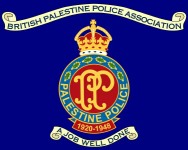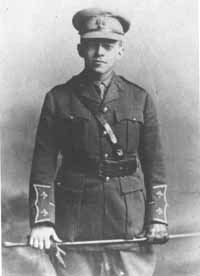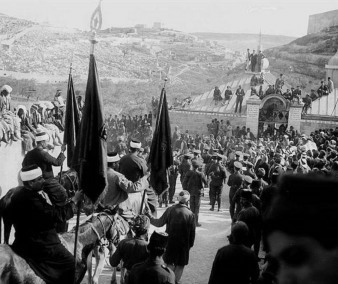Pages in Section 1

Jabotinsky and the Nebi Mussa Riots
ii. Situation Prior to August 1914
iii. WW 1 Protecting the Suez Canal
iv. WW 1 Promise 1
v. WW 1 Promise 2
vi WW 1 Promise 3
vii. WW1 Conquest of Palestine
viii. O.E.T.A.
ix. 1919 Paris Peace Conference
x. Nebi Mussa Riots
xi. The Heroification of Trumpeldor
xii. St Remo Conference
NEXT SECTION
 Vladimir Jabotinsky was a war hero. Instigator of WW 1's Jewish Legion, he was demobilised after complaining to Field Marshal Allenby about the British Army's attitude towards Zionism and the Jewish Legion. Nevertheless , in December 1919, he was appointed a Member of the Order of the British Empire (MBE) for his military service.
Vladimir Jabotinsky was a war hero. Instigator of WW 1's Jewish Legion, he was demobilised after complaining to Field Marshal Allenby about the British Army's attitude towards Zionism and the Jewish Legion. Nevertheless , in December 1919, he was appointed a Member of the Order of the British Empire (MBE) for his military service.
 In the Spring of 1920 whilst living in Jerusalem, he organised a Jewish parade to coincide with the Arab feast of Nebi Mussa, a traditional Muslim event created centuries earlier to counterbalance the influx of Jews and Christians visiting Jerusalem to celebrate Passover and Easter.
In the Spring of 1920 whilst living in Jerusalem, he organised a Jewish parade to coincide with the Arab feast of Nebi Mussa, a traditional Muslim event created centuries earlier to counterbalance the influx of Jews and Christians visiting Jerusalem to celebrate Passover and Easter.
At Jabotinsky's instigation, Jewish youths, nearly all recent arrivals from Europe, marched through Jerusalem demanding a Jewish Defence Arm. The demonstration provoked Arab religious leaders into making inflammatory speeches that resulted in an attack on Jews leading to a number of fatalities and numerous casualties. The Ottoman and Military Police were heavily outnumbered, so the administration had to call on the army to restore law and order.
During the riots, the British searched the offices and apartments of the Zionist leadership, including the home of Chaim Weizman. In a building used by Jabotinsky's defense forces, they found 3 rifles, 2 pistols, and 250 rounds of ammunition. The police arrested nineteen men.
Next day, Jabotinsky protested to the police that he was commander of the defence force and therefore solely responsible, so his men should be released. That resulted in his own arrest. The nineteen men first arrested were each sentenced to three years in prison but Jabotinsky was given a 15-year prison term for possession of weapons. (In July, however, they were all released when a general pardon was granted to all Jews and Arabs convicted in the rioting.)
During this period, a cluster of Jewish settlements in North Galilee, later to be transferred to Palestine, were still in French controlled OETA North. They were guarded by the Jewish Force called Hashomer. An incident occurred here not particularly important in itself, but which was to cause much hassle to British Palestine Police in later years.